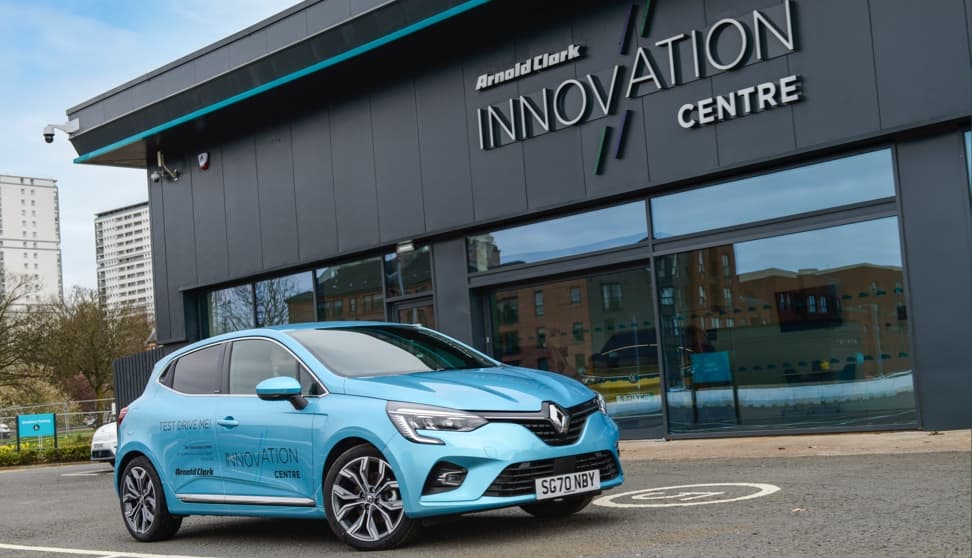However, following the government’s confirmation that cars and vans powered wholly by petrol and diesel will not be sold in the UK from 2030, it's time to start thinking about how electric vehicles (EVs) may impact you in the coming years.
Last year, Arnold Clark unveiled its stunning new £5 million Innovation Centre on Dumbarton Road in the west end of Glasgow, where you can learn about EVs and their impact on the future of driving.
And here at Arnold Clark, we want to make sure you’re aware of the many benefits and advantages of making the switch to electric.
Savings through taxes and grants
When moving to electric, there are a few government grants and tax savings you can take full advantage of.
Firstly, it’s important to highlight that the benefit-in-kind (BiK) rates for electric cars is 1% during the 2021/22 financial year. It'll rise to 2% for 2022/23, remaining there during 2023/24 and 2024/25.
Some BiK rates for petrol and diesel vehicles can run as high as 27%, meaning choosing electric could represent some huge savings.
Electric Vehicle Homecharge Scheme
This grant gives you a contribution towards your home charge point up to the value of £350 (including VAT). However, you’ll need to be quick because it’s set to end on 1st April.
You can apply for this grant once per household/eligible vehicle.
The Workplace Charging Scheme
This scheme offers help to eligible businesses, charities and public sector organisations.
They could receive up to £350 per socket towards the cost of installing electric charge points. To qualify, there must be dedicated off-street parking for staff.
Cheaper to maintain
The same elements as any other vehicle will be checked to determine an EV’s roadworthiness, including tyres, the braking system and headlights.
However, EV drivers will be delighted to know that they no longer need oil changes.
Elsewhere in the car, there’s no requirement for a clutch, gearbox, timing belt or spark plugs, and because most EVs can still produce power even when braking, the car’s movements are much easier on its brakes and tyres.
Electric is the future
Sales of new petrol and diesel cars are set to end in the UK by 2030 - in what will be a huge boost to the battle against climate change.
And, thanks to Arnold Clark's newly opened Innovation Centre in Glasgow, you can learn about the future of driving and the role of EVs.
As well as the two managers, there is a team of dedicated product geniuses working at the centre. They all specialise in alternative fuel vehicles and are there to help educate visitors on the journey towards buying an electric car.
With over 60 AFVs on show at the site, visitors can book a test drive to experience how they handle for themselves.
For those thinking of switching to AFVs for their company, a business specialist will also be on site to help make the most informed choice.
There are no sales at the Innovation Centre, which is specifically an innovation, information, and educational centre.
The Innovation Centre has several different interactive kiosks where customers can learn about AFVs. Staff will be also be on hand to provide information on charging and charging points, and showcase potential savings through things like government grants and incentives.
Charging and range
While you may think charging an EV is much more of hassle than popping to your local petrol station, it doesn’t have to be
Using rapid charging points, some EVs can, on average, be charged for 30 minutes and give you a range of 100 miles, while costing roughly £6.50.
And, if you compare that to the increasing price of petrol and diesel, EV charging will save you money in the long run.
You can often find rapid charge points in public locations like streets, motorway service car parks, petrol stations, larger shopping centres and supermarkets.
And the good news is that the range of EVs is always increasing with some of the latest models achieving a range of over 250 miles.
You can find your nearest charging point here.
Increasing Low Emission Zones in the UK
LEZs set vehicle emission standards on certain road spaces. Older, more polluting vehicles that do not meet the proposed minimum emission standards will face a fine if they enter an LEZ when enforcement begins.
Their overall aim is to try and improve air quality, and it’s likely that they will be introduced into most UK cities over the next few years.
Good for the environment
Electric vehicles are 100 per cent post-production eco-friendly.
Fully electric cars don’t give off any harmful emissions at all, meaning you won’t have any negative impact on public health and global warming.
Quiet and fast
The electric car is quiet, as it doesn’t have to contend with the vibration caused by a petrol engine. They’re also incredibly smooth and relaxing to drive.
What more could you ask for? Well, speed of course!
While electric engines used to be a little slower than their petrol and diesel counterparts, they’ve seriously caught up in recent years.
Learn more
To find out more about the future of the automotive industry, you can book a visit to the Arnold Clark Innovation Centre.



